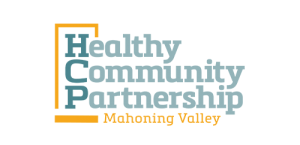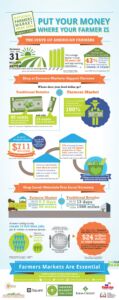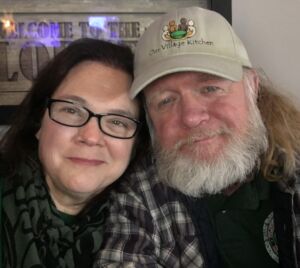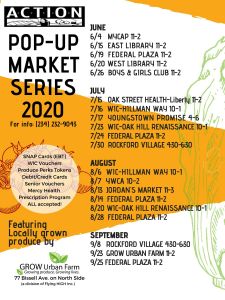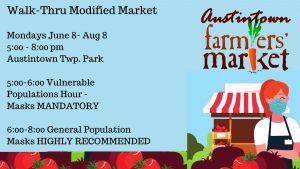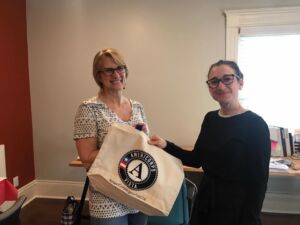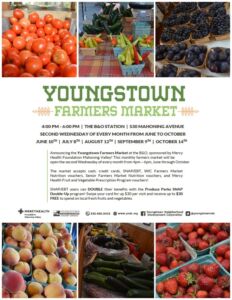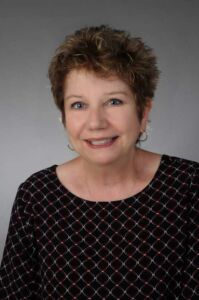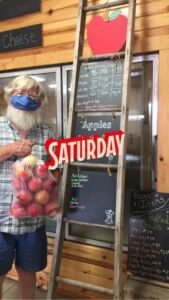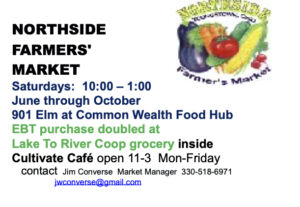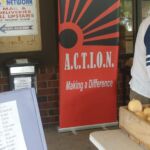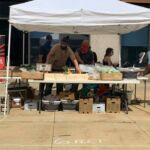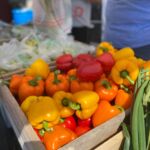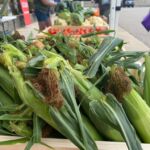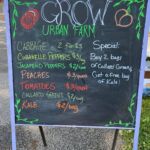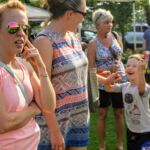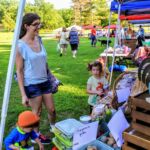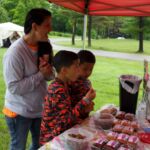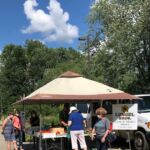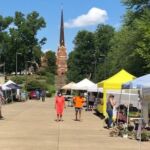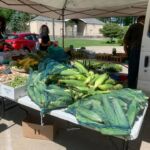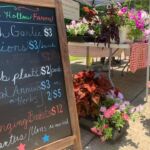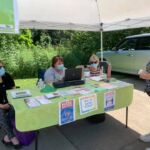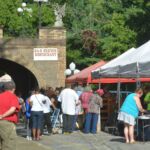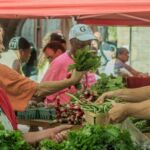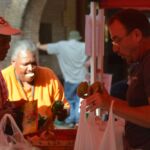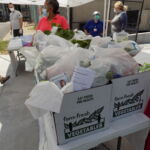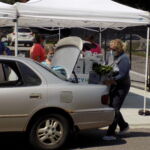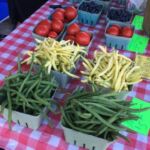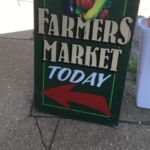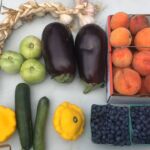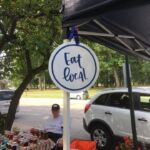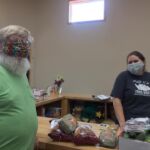HCP Partner Spotlight: Mahoning Valley Farmers Market Managers
This week, August 2-8, is National Farmers Market Week. Farmers Markets have become an anticipated summer staple across the Mahoning Valley. These spaces offer farmers, gardeners, bakers, and creators of all kinds a place to come together to connect with the community and to share good food and stories.
The National Farmers Market Coalition has a harvested a bounty of resources that demonstrate the multiple significant ways farmers markets benefit communities:
- Farmers Markets Stimulate Local Economies
- The USDA estimates that local food sales from farmers markets, food hubs, CSAs, farm stands and farm to schools programs have grown from from about $5 billion in 2008 to $11.7 billion in 2014.
- Farmers Markets Increase Access to Fresh, Nutritious Food
- According to USDA FNS data, 7,377 farmers and farmers markets across the country were authorized to accept Supplemental Nutrition Assistance Program (SNAP) benefits in 2017, more than double the number of farmers and farmers market authorized in 2012 (3,214). In 2017, more than $22.4 million SNAP benefits were redeemed at farmers markets
- Farmers Markets Support Healthy Communities
- Studies of Los Angeles farmers market shoppers reveal that 75% came to market to do more than shop, 55% felt the market increased their connection to community, 99% believed the market improves the health of the community, and 53% believed the market improves perceptions of the neighborhood.
- Farmers Markets Promote Sustainability
- On average, food travels over 1,000 miles from the point of production to the retail store. In contrast, many farmers markets only allow vendors to sell food produced within 200 miles. Some markets only have food grown within 50 miles.
- Locally or regionally sourced produce travels about 27 times less distance than conventionally sourced produce.
- Farmers Markets Preserve Farmland and Rural Livelihoods
- There are 5 times as many U.S. farmers over the age of 65 compared to those under 35. Farmers markets provide one of the only low-barrier entry points for new farmers, allowing them to start small as they learn and test the market.
What makes farmers markets so special is that they are about more than the business of moving produce—they are about the business of moving people. Growers can interact with buyers and create relationships based on the very basic fact that we are all eaters. And, all of us deserve to be able to eat good food.
In celebration of Farmers Market Week, HCP would like to shine our spotlight on our partners who are the magic makers at our local farmers markets. Their stories, in their own words, are shared below.
ACTION Pop-Up Markets: Vicki Vicars, Community Organizer at ACTION
As the Community Organizer for ACTION, I have worked to ensure the smooth operation of the Pop Up Farmers Markets that are being offered to the Youngstown Community in partnership with GROW Urban Farm for the 2020 season. Know that due to Covid 19, we have made some changes this year to practice social distancing and ensure the safety of our shoppers.
How the Market Started
This is our second year for the market series. At the beginning of 2019 Youngstown Mayor Jamael Tito Brown declared that Youngstown was a food desert, according to national standards. ACTION declared its intent to assist others in combating regional food insecurity. One step in this process was to build a collaboration with the local organic farm, GROW Urban Farm, located on the northside of Youngstown. Through this partnership ACTION launched the establishment of a 21 pop-up farmer markets in every region of the city. Approximately 2,000 pounds of food was distributed our first year.
Why Farmers Markets Matter
Knowing that it is often a challenge for many residents to find fresh produce in the city, we carefully select our locations so that we reach as many folks as possible. We partner with our host site to advertise and if possible, offer incentives for customers to purchase fruits and vegetables. We are able to accept many forms of payment including SNAP Benefits, WIC, Senior Farmer Coupons, Produce Perks as well as cash, credit and debit.
Market Memories
There is so much I love about being involved with these markets. I am completely impressed by GROW Urban Farm and what they have done on empty city lots. It’s a beautiful, inner city farm and I know they welcome visitors. Stop out and see them (77 Bissell Avenue). What a gift to be able to eat locally grown food. The other experience that brings me joy is watching kids pick out their own fruit and vegetables. They like to tell me their favorite way to eat them. Healthy habits start young and I am grateful to be a part of this.
ACTION is committed to addressing food insecurity in our community and these pop up markets have been a fun, easy way to do so.
Austintown Farmers Market: Shannon Lehn, Market Manager
My name is Shannon Lehn, Market Manager for the Austintown Farmers’ Market, Monday nights in Austintown Township Park.
How the Market Started
I was teaching yoga at the Lake Milton Farmers’ Market, where my sister, who has Maple Leaf Acres, was a vendor. As the summer went on, my son started playing football at the same time as the market, and I said, “I’m out”—it’s important that I be there for his games. Bridget (my sister) had asked me to come back, because the yoga crowd didn’t really come to the market anymore without me teaching, and I said I couldn’t do that, but I could see if we could do one Monday nights in Austintown Township Park, since I was teaching yoga there at that time. I thought, “oh, we’ll just do a little market.” Seven years later, here we are.
Why Farmers Markets Matter
I can’t speak for all markets, but I know for ours, it is rare that you see anyone looking at a screen. We have families that come out together and couples who have their date nights at our market. You see kids playing with their parents and communities throughout our area coming together, people making friends. We are supporting our local growers and makers, keeping our money local and our small businesses also teach us about nutrition (I learned how to roast beets at the market!) and eating well, and why it’s important. One of our customers (and friends) has said she was told our meat vendor that they make sure that their animals only have one bad day in their lives. I thought that was so telling, and really made me think. We are able to bring healthy lifestyles to our community through education, yoga, and opportunity for new flavors and foods to be tried. I always say our market is about community, and I truly feel that has been our largest asset, our community.
Market Memories
There are so many. It could be watching a little boy find a toad while at the market; having Jay from Jackson ‘Maters teach me about horseradish and how to make it; the friendships that have been made and the community that has been built; being able to help young (the youngest has been 13) entrepreneurs launch their businesses; playing in the rain – my favorite thing about the market overall is being with our people and walking barefoot through the park.
Warren Farmers Market: Sevasti Tripoulas, Market Manager
I was introduced to the operation and outreach of the WFM while serving as an AmeriCorps VISTA at Trumbull Neighborhood Partnership. Thankfully I have been given the opportunity to be part of the WFM team.
How the Market Started
The Warren Farmer’s Market promotes a sustainable farmer’s market that benefits local food producers and community members. The Warren Farmer’s Market improves the quality of life for Warren’s community members by reducing food insecurity.
The Warren Farmer’s Market formally on Courthouse Square in Warren, OH is now located at Perkins Park near the Warren Community Amphitheatre. WFM is truly a local farmer’s market where producers sell their locally grown and value-added products directly to consumers. This outdoor market is held on Tuesdays from 3-6pm from early June through early October. It began in 2013 as a monthly market and became a weekly market in 2014. It was established and supported through a partnership between Trumbull Neighborhood Partnership (TNP), Lake-to-River Cooperative, Mercy Health (formerly Humility of Mary Health Partners), and Trumbull County Health Department’s Creating Healthy Communities Coalition. TNP continues to manage the market with the support of many organizations, businesses, and government agencies.
Why Markets Matter
The Warren Farmer’s Market provides a venue for neighbors to connect with local farmers and food producers, creates opportunities for learning about healthy food and living, and provides a space for the community to flourish.
The Warren Farmer’s Market was able to adapt to the current COVID challenges by moving WFM to Perkins Park where more space was available for social distancing and in an abundance of caution if the market needed to change to a drive thru plan. Through free mask giveaways, providing a wash station and hand sanitizer along with the vendor booths 10 feet apart, the WFM consciously adheres to the Trumbull County Health Department recommendations
The WFM plans to remain safe while providing healthy produce, delicious snacks, desserts, beautiful flowers and gifts, fresh preserves, delicious homemade bagels and perfectly sweet and slightly salted kettle corn, golden honey and so much more. The WFM also welcomes community resources from organizations such as Valley Votes, Citizens Uniting Citizens, 2020 Census, TCAP and so much more.
Market Memories
A 2020 market memory is the view of the determined customers arriving at the Warren Farmers Market not only with their reusable shopping bags but with their 2020 face covers. The care and consideration the people have for each other in our community makes the Warren Farmers Market an even more beautiful space.
Youngstown Farmers Market & the Fruit and Vegetable Prescription Program: Bridget Lackey, RDN, LD – Community Health Educator, Mercy Health Youngstown | Tom Hetrick, Nutrition Educator, Mercy Health Youngstown
How the Market Started
The seed for the Youngstown Farmers Market was planted in 2013 with grants through the Catholic Health Care Partners to create the Fruit and Vegetable Prescription Program (FVRx).
The new FVRx program cultivated support from a partnership with the Lake to River Food Coop to expand an existing farmers market within St. Elizabeth to patients of Humility of Mary Health Partners now Mercy Health Care physicians. The program provided support for for 200 enrollees to receive $25 monthly to shop at the market – May through October. Our goal was to expand access to fresh, local produce to those most in need and to improve health issues by providing access to healthier, more nutritious foods.
These first farmers markets were set up at St. Elizabeth’s Hospital in Youngstown and the area outside St. Joe’s Tod Avenue facility in Warren.
In 2014, the program moved to the Courthouse Square in downtown Warren with the establishment of the Warren Farmers’ Market. Further expansion occurred as the Idora Farmers Market was also established. By 2017, the RVRx Program was available at 3 locations for 200 enrollees: St. Elizabeth’s Hospital and the Idora Farmers Market in Youngstown and Courthouse Square Warren.
In 2017, the program experienced a significant growth spurt. Through a partnership with the Youngstown Neighborhood Development Corporation (YNDC) and the Mercy Health Foundation, the USDA Food Insecurity Nutrition Incentive (FINI) grant was awarded and FVRx program was able to be expanded four fold to reach over 800 potential enrollees. With this significant increase in potential enrollees, we knew the existing St. Elizabeth’s location could not support the increase volume.
In 2018, we moved to the B&O Station in Youngstown, and remained there for 2018 and 2019 with patient volume increasing to over 700 enrollees. The FVRx program also expanded to Cultivate: A Co-Op Café to provide a more convenient shopping experience that was available anytime while the cafe was open during the months the program was active. This provided more flexibility than the monthly Youngstown Farmers Market. The program was also able to expand to include the Howland Farmers Market as an alternative in Trumbull County, which operates on Saturdays providing more flexibility for FVRx patients.
The FVRx program has encouraged partnerships to blossom with multiple local farmers and nutrition education providers. Sites have been able to offer educational experiences like cooking demonstrations, food sampling, and health screenings made possible with partners like OSU Extension services, Lake to River Food Coop and Cultivate Café, YSU Dietetics Program, Mercy Health, and Nutrition Services/ AVI chefs.
As was the case for all of our partners, 2020 and the COVID-19 pandemic created multiple challenges and necessitated the birth of the Fresh Produce Box: A $25 value assortment of fresh local produce provided in a safe, socially distant drive away format. This format, though safer to stop the spread of the virus, is very labor intensive and requires multiple partnerships with many local community volunteers from Youngstown Public Health, Mahoning County Public Health, Youngstown Promise Neighborhood, Healthy Community Partnership, RSVP Mahoning Valley, YNDC, TNP, EGCC, Youngstown City Parks and Recreation, and the SCOPE Senior Center.
Why Markets Matter
The FVRx Program and the Youngstown Farmers Market went through many changes annually, at first offering tokens then expanding to include SNAP Double Up benefits made available through the USDA FINI grant. These nutrition incentive programs provided income to many local farmers and exposed many residents who had never visited a farmers’ market the opportunity to explore a variety of new foods, the chance to chat with a farmer, and the opportunity to improve their health. The value of farmers markets is the community connection. So making markets an exciting and enjoyable experience led to offering educational experiences as well as entertainment to celebrate healthy food and healthy people.
Putting some numbers behind this, since 2018, the Youngstown Market (including the drive-aways in 2020) has provided approximately $70,000 in fresh, local produce to food insecure individuals & households through nutrition incentives (SNAP Double Up & FVRx).
And, here are the number of enrollees in the FVRx from 2013-2020: 2013-2017: 200 | 2018: 550 | 2019: 715 | 2020: 550
Resulting in a total of 2,015 lives enriched with healthy foods.
Market Memories
Bridget—
The FVRx faithful standing in line 2 hours before opening at St. Elizabeth and the friendships formed by those participants. The many new food tastings and learning to appreciate the flavor and value of fresh locally grown produce, especially sweet summer favorites like strawberries and peaches, but even more savory foods like potatoes.
The strong bond between people and food always stands out. I remember one woman desperately wanting a large cabbage and those in line ensuring she got it, so she could make stuffed cabbage for her daughter who was undergoing chemotherapy.
Another would be in 2018 when we opened the B&O Station Market and seeing the community come out, in huge numbers, to visit that area once seen as abandoned and forgotten. To see it full of life again was inspiring.
Tom—
One of my greatest “satisfactions” from the market is simply being there with folks on their personal journey to better health—providing nutritious food in times of need. For example, early in the 2018 season at the B&O, we had to call an ambulance for a woman who got overheated. She had just started chemo and when she sat down in the shade and took off her hat, I saw her hair had fallen out. I can’t tell you how happy I was to see her back the next season, full head of hair, smiling, eager to shop for her favorite produce.
Youngstown—Northside Farmers Market: Jim Converse, Market Manager
- ACTION Pop Up Markets
- ACTION Pop Up Markets
- ACTIONACTION Pop Up Markets
- ACTIONACTION Pop Up Markets
- ACTION Pop Up Markets
- Austintown Farmers Market
- Austintown Farmers Market
- Austintown Farmers Market
- Austintown Farmers Market
- Austintown Farmers Market
- Warren Farmers Market
- Warren Farmers Market
- Warren Farmers Market
- Warren Farmers Market
- Warren Farmers Market
- Youngstown Farmers Market
- Youngstown Farmers Market
- Youngstown Farmers Market
- Mercy Health | FVRx Produce Box Drive Away
- Mercy Health | FVRx Produce Box Drive Away
- Youngstown—Northside Farmers Market
- Youngstown—Northside Farmers Market
- Northside Youngstown—Northside Farmers Market Market
- Youngstown—Northside Farmers Market
- Youngstown—Northside Farmers Market
